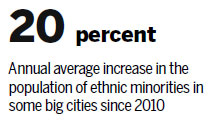Growing mobility brings challenges
Updated: 2015-08-19 07:45
By Yang Wanli(China Daily)
|
|||||||||||
Report: Authorities should pay more attention to needs of cities' ethnic minority populations
China's urbanization process has boosted population mobility among ethnic minorities in big cities, posing new challenges to government management, according to a report published on Tuesday.
Since 2010, the population of ethnic minorities - members of the 55 non-Han ethnic groups - in cities such as Guangzhou, Shenzhen, Ningbo and Beijing had grown by an annual average of 20 percent, according to the 2015 Annual Report on the Development of Ethnic Affairs in China.
The report was released by the Institute of Ethnology and Anthropology at the Chinese Academy of Social Sciences.
In Beijing, more than 210,000 ethnic minority migrants arrived between 2000 and 2010. In the same period, 172,000 arrived in Shanghai, according to the report.
The report shows that the urbanization process also resulted in greater ethnic diversity in the cities.
For example, in Shenzhen, one of China's pilot cities for the opening-up policy in the 1980s, only 12 ethnic minorities lived there in 1981. But the number increased to 53 by 2010.
Shanghai also saw the same diversity, increasing from 11 ethnic minorities in 1951 to 55 last year.
"More members of ethnic minorities left home to work in other cities. They acclimated themselves with the new circumstances, but may encounter problems related to employment, education and culture," said Zheng Xinzhe, a researcher from the institute.
Currently, the number of members of ethnic minorities with hukou, or permanent residence, in those big cities remains limited, the report said.

In Shenzhen, for example, more than 90 percent of people from ethnic minorities don't have hukou.
"Hukou is not just an identity. In most Chinese cities, it is also related to the rights of residents, such as the eligibility to buy a car, or a house. For the younger generation, it also closely linked with education," Zheng said.
He said ethnic minorities only accounted for a minority of those big cities' overall population, and consequently their requests are less likely to be taken notice of by the authorities.
"With the acceleration of the urbanization process, more ethnic minorities will be involved in urban life. In this process, efforts from the urban authorities are also needed," Zheng said.
China has witnessed soaring urbanization in recent years. The National Bureau of Statistics said that China's urbanization rate climbed from 36.09 percent in 2000 to 54.77 percent last year.
The expedited process of urbanization has created ample opportunities for China's economic development, which also brings more chances for its people.
"More supportive policies should be made for those migrants. And cultural exchanges are also essential," said Wang Yanzhong, director of the institute.
yangwanli@chinadaily.com.cn
(China Daily 08/19/2015 page5)
Today's Top News
Six Chinese nationals confirmed dead in Bangkok blast
Rain in Tianjin poses no health risk, says official
Two HK women among four Chinese killed in Bangkok blast
South Korea's Park has good reason to attend Sept 3 parade
Yuan move is likely to deliver positive results in long term
Sodium cyanide in Tianjin to be cleared
Premier Li pledges thorough investigation into deadly blasts
Bomb in Thai capital kills 19, including 3 Chinese nationals
Hot Topics
Lunar probe , China growth forecasts, Emission rules get tougher, China seen through 'colored lens', International board,
Editor's Picks

|

|

|

|

|

|






